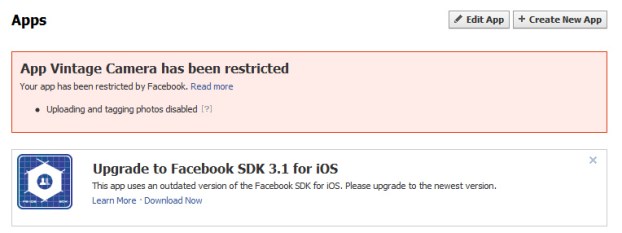 Is Facebook pulling a Twitter? The social network is sitting pretty when it comes to photo-sharing thanks to its acquisition of Instagram, as the app just reached the 100 million user milestone, but there are reports surfacing that Facebook is starting to block Instagram competitors. Specifically, French app developer Presselite recently discovered that its popular photo app, Vintage Camera, has been blocked by Facebook. So what gives?
Is Facebook pulling a Twitter? The social network is sitting pretty when it comes to photo-sharing thanks to its acquisition of Instagram, as the app just reached the 100 million user milestone, but there are reports surfacing that Facebook is starting to block Instagram competitors. Specifically, French app developer Presselite recently discovered that its popular photo app, Vintage Camera, has been blocked by Facebook. So what gives?
New apps need access to users’ outside social profiles if they want to hit widespread success; the ability to have content made with its app shared on Twitter, Facebook, and elsewhere is crucial to growth. So with Facebook deciding to block all photo uploads from Vintage Camera to its user’s Facebook pages, you can see why Presselite was outraged. And so were its users, as the BBC originally reported.
Vintage Camera definitely has hints of being Instagram-like, but tries to put its own stamp on the genre (really, that’s tough for any filter app out there now that Instagram has sufficiently dominated the space). But at the end of the day, Vintage Camera is a photo app that uses filters – just like Facebook’s billion dollar baby, Instagram. Vintage Camera’s user numbers, which sit at a respectable 8 million, might also make Facebook uncomfortable. It’s no 100 million, but it’s a relatively young app and could be enough to make Facebook nervous.

Apparently Vintage Camera was receiving “strong negative feedback,” which merited shutting off the app’s pipeline to Facebook. Presselite’s co-founder Antoine Morcos says that isn’t the case, telling us the app has received minimal negative reviews. More specifically, users were uploading between 1,000 and 3,000 photos, and only 0.03 of users had anything negative to say, according to AppAdvice. On the app’s page in the Facebook App center, it has a rating of 4.5 out of 5 stars.
Of course, Facebook fired back, saying:
“Pending on the violation, we give developers an opportunity to come into compliance via a warning system. In the case of this application, the application was not in compliance with our platform policies and had received three warnings prior to our systems taking action on the application.”
According to Presselite, this was the answer received after questioning why Vintage Camera was blocked:
“We’ve checked out the circumstances of your app’s restriction, and we found that your app received strong negative feedback from users and their friends. Unfortunately, we will not be able to restore your app’s functionality.”
But the Vintage Camera developers aren’t backing down. “So Facebook seems to consider that 0.3 percent negative feedback is ‘strong’?” Morcos tell us. “Currently, Facebook does not provide any acceptable level of negative feedback, so Facebook is free to decide for each case.”
“They do not give any details on why Vintage Camera has been restricted, and which part of Facebook policies our app is in violation. Facebook has not been able to provide us the clear reason of this restriction,” Morcos says. “Also, we want to understand how Facebook could restrict our application with only 0.3 percent negative feedback. Vintage Camera is not violating any of Facebook Platform Principles.”
Morcos also shared these revealing images with us, showing that the app was, by all accounts, providing a positive user experience.


Vintage Camera has enough similarities to Instagram that it wouldn’t be entirely surprising if Facebook were underhandedly compromising Vintage Camera’s growth by closing off its access. Facebook did block Vine (owned by Twitter) from using Facebook’s “find people” feature, and blocked Yandex’s Wonder app, just as Facebook launched the competing Graph Search. It’s another unfortunate incidence in a trend where social networks are making it hard and harder to socially share content. Image that.


